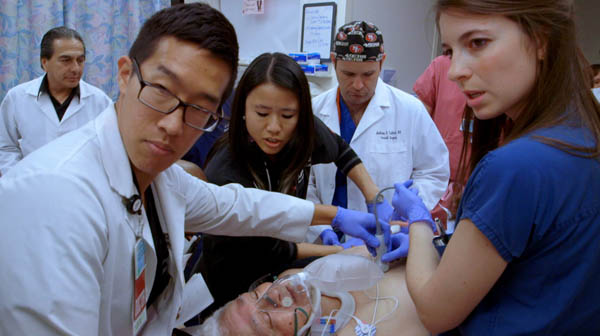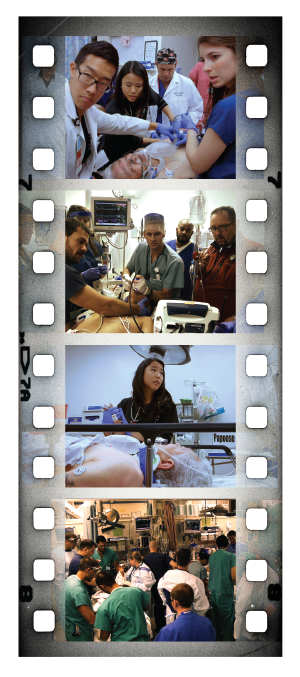
During his four years of residency at the University of Southern California Los Angeles County General Hospital, Ryan McGarry, MD, recorded more than 500 hours of emergency department footage. Now, one year out of residency and an assistant professor of emergency medicine at New York-Presbyterian/Weill Cornell Medical College, Dr. McGarry is about to release the 82-minute documentary those 500 hours produced: Code Black. The documentary is named after the highest-level code in LA County’s institutional disaster plan, one which stands for a 30-hour wait in the emergency department and no beds upstairs. Code Black was the norm in the country’s busiest ED at the time of the filming, so Dr. McGarry had his hands full learning the medicine, producing the documentary, and trying to maintain a personal life.
Explore This Issue
ACEP Now: Vol 33 – No 06 – June 2014Code Black has astonished film festival attendees, winning awards at the Los Angeles Film Festival, the Aspen Filmfest, the Starz Denver Film Festival, and the Hamptons International Film Festival, along with a special recognition at the Vancouver International Film Festival. Emergency physicians and laypeople alike may experience the difficulties and triumphs of being an emergency medicine resident in one of the nation’s busiest EDs, illustrating how difficult and challenging this environment really is. The film gives the real-world view from the inside, hopefully capturing the hearts and minds of those who know little about the safety net of our health care system yet are always reliant on its existence. Code Black will be premiering June 20th in New York City at the IFC Center. In July and August, it will be released in 40 cities throughout the United States.
At the end of the film people give us a standing ovation. I wish I could share that with every physician, nurse, and X-ray tech who leaves a really tough shift.
–Ryan McGarry, MD, Director of CODE BLACK
Dr. McGarry, who wrote and directed Code Black, recently sat down with ACEP Now’s medical editor in chief, Kevin M. Klauer, DO, EJD, FACEP, to talk about the process of making the movie and what he hopes to accomplish with the film.
KK: Give us an overview of Code Black.
RM: Code Black is a feature documentary film that I directed and was released to the film festivals in 2013. The film asks the questions: If you signed up to be a doctor today, and you came in with expectations for how you wanted to practice medicine, how long would it take before the greater system and the ideas of billing, profit, regulation, documentation, and medical legal practice start to chip away at those ideals? How are you going to protect them? And, once they are threatened, how do you fight back?

Top to bottom: Danny Cheng, MD, and Jaime Eng, MD, (at left) with patient; Dave Pomeranz, MD, Ryan McGarry, MD, and Billy Mallon, MD, at bedside; Jamie Eng, MD, with patient; C-Booth at LA County Hospital.
KK: When did you have the epiphany that “I’m qualified to do this, and this story has to be told”?
RM: I can speak to the filmmaking qualifications first: I had none. I considered an MSA in film school, but I declined that on the notion that if I did want to pursue filmmaking someday, I’d have a lot more access to the human condition as a physician than as a film student. The documentary really formed itself when I was a rotating medical student at USC. I was with the old LA General hospital and in the middle of this special area of the ER called C-Booth. I was struck by the intensity of that space. I wanted to know, “Why does intensity matter?” And my answer is that intensity shows us priorities. We found that physicians and health care staff find nostalgia in that notion of “remember when you were just a training doc and your biggest priority was patient care.” I miss that most basic of concerns. Now I’m worried about the right RVUs, statisticians, documents, and Press Ganey.
KK: Does it come out in the documentary that you were focused on care, but you lost focus because of all the regulatory red tape?
RM: That’s a major theme. The three acts of the film mirror how an emergency medicine physician might mature along the way, especially in a big, busy trauma center. When physicians watch it, they grasp onto that. When laypeople watch it, I think they start to say, “I didn’t realize that this is going on. Why is the system so focused on not us and not my doctor?”
KK: Who’s working with you on this project?
RM: In the first days of the project, we had the support of some of the USC faculty: Drs. Ed Newton, Billy Mallon, Jan Shoenberger, and Diku Mandavia, along with the hospital administration and the LA County Board of Supervisors. Beyond that, there was the filmmaking world: Mark Jonathan Harris, who’s a three-time Academy Award winner in documentary film, and Marti Noxon, who scripted for ER.
KK: Do you think you’ll make another film?
RM: [The market research] says that a part two with just Billy Mallon might sell really well! As far as Code Black part two, we’ve probably said enough on this topic in the feature.
KK: How did it affect your personal life?
RM: It was significant. I didn’t expect to make a film as a resident. It was three years of no vacation, and any day off I had went toward this effort. The goal of residency is to learn how to be a proficient physician, and I had to be careful in order to assure that the film could never be more important than that. I have to thank every one of my classmates and my program director for a lot of support along the way, whether for last-minute trades or just the ability to take a 20-minute nap on a shift. Even still…residency by default should consume you, and filmmaking by default should consume you. You put them together at the same time, and there’s going to be some fallout.
KK: Do you regret the decisions you’ve made?
RM: I regret allowing the pressure to dictate how I acted and how I thought. I certainly don’t regret making Code Black at the time that I did. One thing that I feel very lucky to have experienced is nonmedical people sitting through some pretty tough stuff in cases we show, and at the end of the film people give us a standing ovation. I wish I could share that with every physician, nurse, and X-ray tech who leaves a really tough shift.
KK: Is this just a venture of altruism, or is there the potential for you to have some well-deserved financial benefit?
RM: It takes in the low seven figures to produce a film of this scope. Nobody makes a buck off of documentaries. Your best-case scenario is that you break even and that you change how people think.
KK: Roughly, what does it take to produce a documentary like this?
RM: The film is supported by SonoSite FujiFilm. We made an agreement with them that said in exchange for private support for the production, we would make a true story about the challenges of the front lines—and the sponsor did this without any control with regards to creative oversight or required brand placement. We went through 16 cuts on Code Black. For a documentary, you’re building an essay from a vast vocabulary of footage that exists as a library in volume. So you have an editor, an assistant editor, an archivist, a sound designer, a sound mixer, a color corrector, and, of course, all of the producers it takes to make a documentary.
KK: I think it can change perspectives a great deal about what emergency medicine is. I hope that you have a successful career as a director, and I hope we don’t lose you from emergency medicine too soon because of it.
RM: I wouldn’t give up my shifts for anything. I’ve met Academy Award winners who would love to have the ability to bridge their time in between projects with intermediate employment but don’t have the opportunity to do what we do. It really gives that crowd an entirely different perspective when they’re worried about a publicist or a new script and you’re saying, “You know, I just helped save a life.” It’d be crazy to ever give up on that investment because it’s really a gift.
Francesca Baratta is a freelance writer based in New Jersey.
Pages: 1 2 3 4 | Multi-Page





No Responses to ““Code Black” Documentary about Los Angeles County General Hospital Captures the Challenge, Energy of Emergency Medicine”